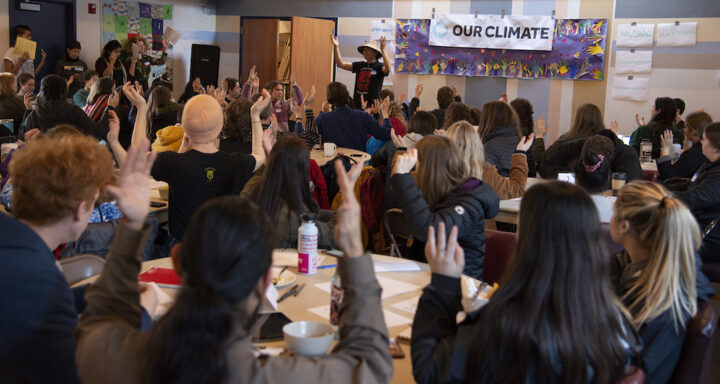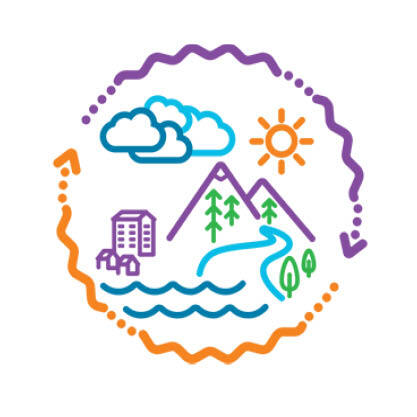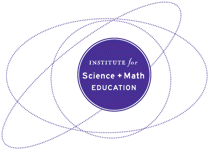Let’s Talk Climate! Bridging Climate Justice Learning and Action Across School, Home, and Community

WHY IT MATTERS TO YOU
- Students, families, and communities— especially those who are most impacted by climate change—have valuable knowledge about climate impacts and solutions to bring into the classroom to guide learning about climate justice.
- Educators should utilize school resources and time to provide a holistic understanding of climate change by connecting classroom learning and community resources, activities, and organizations—around composting, cleanups, civic engagement, place-based walks, movies, local issues, and events.
Students feel and see climate change and its impacts all around us. Indigenous People, People of Color, People Living in Poverty, People with Dis/ abilities, the young and the old, and those living at the intersections of these identities, are especially impacted by changing lands and waters due to systems of oppression that govern social, political, and economic dynamics among people and places. Teachers can support solution- and justice-centered learning of climate change by bridging conversations between school, home and community across their curriculum. They can help others Talk Climate!
Authors:
BY IKRAN ELMI, TI’ESH HARPER, MEGAN SLADE & HEATHER PRICE | JANUARY 2022
REFLECTION QUESTIONS
- How can local climate, health, and environmental justice issues and solutions be woven into your curriculum, connecting school, home, and community?
- What resources and experiences do you need to expand your knowledge of and engagement with local climate justice issues?
- What local equity-focused organizations might you collaborate with to expand climate justice learning?
Things To Consider
- Everyone, particularly youth, deserves to learn how climate change and intersecting issues of justice are impacting their daily lives and communities. Three quarters of teachers say schools should teach about climate change & impacts, and 4 out of 5 parents agree. Families want to see climate change taught in schools. Young people are concerned about climate change, and they influence the attitudes of adults in their lives.
- Talk about climate in ways that support young peoples’ emotions helps to build a healthy, adaptive relationship with the realities of a changing climate and motivate their engagement in community and organizational climate action.
- Connect STEM learning to social-emotional and justice-focused learning at your school and across disciplines. Climate change touches everything we teach and belongs in all subjects from history, art, and English, to math and science.
- Teachers play a key role in bridging climate justice learning and action between home and school, encouraging youth to bring family and community knowledge and practices into the classroom and take home new learning about climate science and justice. They can foster intergenerational learning, elicit family feedback, and encourage home-school climate conversations. All teachers, across disciplines and grades, need support to implement justice-focused climate learning sequences.
Attending to Equity
- Marginalized communities experience climate impacts first, worst, and longest due to current and historical systemic racism and oppression. It is critical that the expertise of frontline community organizations, educators, and leaders is centered in climate justice curriculum and educational engagement.
- Teachers need an investment of resources—including time, financial support, and training—to incorporate climate justice and community engagement into existing curriculum so students receive culturally responsive and intersectional teaching and learning.
- Provide paid professional learning for educators to shift curriculum and learn how to engage students, family, and community. Examples of this include ClimeTime, the Climate Justice Symposium for Transforming Education, and Climate Justice in the Curriculum.
Recommended Actions You Can Take
- Foster ongoing dialogue between home and the classroom about climate justice. Engage in ongoing and locally contextualized conversations about climate change and climate justice with other youth, families, educators, and community members. Schools should invite families and community members to share their experiences and climate actions with students. There are many good resources to share about talking climate or to clarify climate science understandings.
- Foster authentic and mutually beneficial partnerships with local organizations to connect school-based learning with community issues, helping students recognize climate action happening around them and how they can be part of it. Examples include: Caring For Our Watersheds, Project Citizen, World’s Largest Lesson, the Duwamish River Cleanup Coalition, and Seattle Youth Climate Action Network.
- Engage students in school decision making about the climate impacts of school facilities and operations and identifying and implementing solutions. This supports place-based climate learning and action projects that engage learning in place and community. It might focus on places for outdoor learning, food waste reduction, building electrification, etc.
ALSO SEE STEM TEACHING TOOLS
STEM Teaching Tools content copyright 2014-22 UW Institute for Science + Math Education. All rights reserved.
This site is primarily funded by the National Science Foundation (NSF) through Award #1920249 (previously through Awards #1238253 and #1854059). Opinions expressed are not those of any funding agency.
Work is licensed under a Creative Commons Attribution-ShareAlike 4.0 Unported License. Others may adapt with attribution. Funded by the National Science Foundation (NSF). Opinions expressed are not those of any funding agency.


 Email Feedback
Email Feedback




